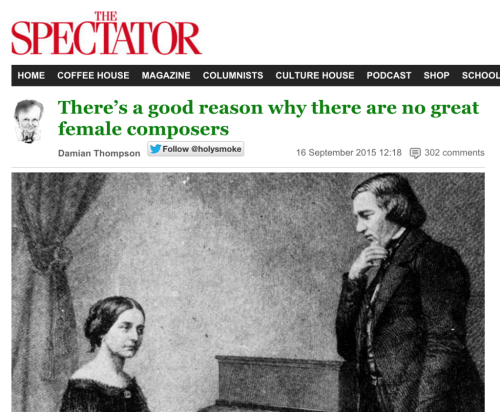Hey, y’all! I just wrote a follow-up to my last blog entry for NewMusicBox:
“Five Takeaways From The Conversation on Female Composers”
Many thanks to the fine folks over there. Feel free to continue the conversation! The places where I’d most like you to continue the conversation would be at local artistic committee meetings, at music stores, at your private teachers’, and anywhere else where repertoire is decided and debated.


Thank you for writing the original piece and this recap! Reflecting on my own musical career I can’t list a single female composer but the list of male composers I can name is a long one. Why is it that my band directors chose an overwhelming majority of piece written by men?
Of the 7 band directors I’ve had 3 of them were women. Even the women chose a majority of male composers. I think it speaks to, like you mentioned, how our society creates our musical cannon. I’m eager to recommend female composers, past and present, to my current band director. Does anyone have suggestions?
Thanks for the kind words! I know relatively little about the band repertoire, but that being said, you can always poke around and make arrangements yourself if you can’t find something at the level or instrumentation you want or need. I arranged an Amy Beach Minuet for my local amateur string orchestra a few years ago. Let me know what you find!
Your original post was terrific and made me laugh, and your followup is excellent and thought provoking. I’m glad your voice is so prominent in this much needed discussion.
I appreciate it!! Thanks!
I enjoyed your original post very much… and I think you might be interested in a blog by Jeanne de Montbaston… it’s not a music blog but she translates medieval books, poems, latin, etc. in a way I think relates. Here’s a link to an article that touches on gender bias in critique and historical writing: https://readingmedievalbooks.wordpress.com/2015/01/18/women-hawks-and-english-literature-exams/
in which she writes:
“Once we recover these facts, the significance of that ‘anonymous’ voice in the final lines comes clearer – to me, anyway. The speaker is not gendered, but – like hawks, ships and bells – anonymous speakers throughout English Literature are often, in Virginia Woolf’s words, women.”
“To recover female voices within such a male-dominated poem – and within such a male-dominated textual tradition, with its echoes of Yeats and White, the clerics of the medieval Church and the Father and Son of the Trinity – is difficult, and daunting. As is fairly often the case, it requires more contextual knowledge to find the echoes of women’s voices in this poem. This is because close reading is never really close reading in perfect isolation from the hierarchical structures of English literary culture – as the first proponents of Cambridge Practical Criticism thought it could be. It’s a tool we use, not an ideology. But, at the same time, we can’t forget that, studying hundreds of years of male-dominated literature and literary criticism, it’s a tool that can’t be separated from the ideological conditions in which it was developed.”
“…how do we learn to read literature, and can the tools we use ever be free of gender bias – is pretty relevant to all of us, I think.”
You mentioned in your follow-up would we see Mozart for the same genius if discovered in the modern day… and I don’t think that’s the right direction or question actually. He wasn’t just technically a prodigy at age 4 (or was it 5)…he was controversial for writing opera in German which was considered impossible to make beautiful. He brought his music to the masses in what was considered vulgar productions and did not just remain a musician for kings. The voice parts of the instruments that can all be heard at once, and distinctly is like the jazz of the day. We need to note him in his time period, in his context, in his evolution to hear him today…
Thanks for your blog. I love discovering your questions and challenges.